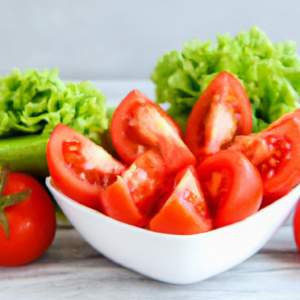Are you curious about how to follow a vegetarian keto diet? If you’re someone who wants to reap the benefits of a ketogenic diet, while also sticking to your vegetarian lifestyle, you’ll be pleased to know that it is indeed possible. This article will guide you through the ins and outs of following a vegetarian keto diet, answering any questions you may have along the way. Whether you’re a vegetarian looking to incorporate more healthy fats and low-carb foods into your diet or a keto enthusiast interested in exploring plant-based options, you’ve come to the right place. Let’s explore the world of vegetarian keto together!
What is a Vegetarian Keto Diet?
A vegetarian keto diet combines the principles of both vegetarianism and the ketogenic diet. The ketogenic diet, often referred to as keto, is a low-carb, high-fat diet that aims to put the body into a state of ketosis. In this state, the body burns fat for fuel instead of carbohydrates. A vegetarian diet, on the other hand, excludes meat and often focuses on plant-based foods.
Understanding the Ketogenic Diet
The ketogenic diet involves significantly reducing carbohydrate intake and increasing fat consumption. By minimizing carb intake, the body is forced to use stored fat as its primary source of energy. This metabolic shift can result in weight loss, improved blood sugar control, and increased energy levels. Foods commonly consumed on a ketogenic diet include avocados, nuts and seeds, oils, leafy greens, and high-fat dairy products.
What is a Vegetarian Diet?
A vegetarian diet typically excludes meat, poultry, and seafood. However, it still allows for the consumption of plant-based foods such as fruits, vegetables, grains, legumes, nuts, and seeds. Many vegetarians also include dairy and eggs in their diet. There are different variations of vegetarianism, ranging from lacto-ovo vegetarians who consume dairy products and eggs to vegans who avoid all animal products.
Combining Vegetarianism and the Keto Diet
Combining vegetarianism with the principles of the ketogenic diet may seem challenging at first, as the traditional keto diet relies heavily on animal-based fats and proteins. However, with careful planning and consideration, it is possible to follow a vegetarian keto diet. This involves selecting plant-based sources of protein and healthy fats while minimizing carbohydrate intake.
Benefits of a Vegetarian Keto Diet
Following a vegetarian keto diet can offer various benefits. Here are some of the advantages you may experience:
Weight Loss
Both the ketogenic diet and vegetarianism have been associated with weight loss. By restricting carbohydrates and emphasizing high-fiber, nutrient-rich plant-based foods, a vegetarian keto diet can support weight loss goals.
Improves Heart Health
The vegetarian component of this diet, which emphasizes plant-based sources of fats, can have positive effects on heart health. By consuming healthy fats such as those found in avocados and nuts, and reducing the consumption of unhealthy fats from animal sources, you can support heart health and reduce the risk of cardiovascular disease.
Stable Blood Sugar Levels
A vegetarian keto diet, with its focus on low-carbohydrate foods, can help stabilize blood sugar levels. This can be particularly beneficial for individuals with diabetes or those looking to prevent blood sugar spikes and crashes.
Reduced Inflammation
By including anti-inflammatory foods such as leafy greens, nuts, and seeds, and minimizing processed foods and added sugars, a vegetarian keto diet can promote a reduction in inflammation within the body. This may result in decreased risk of chronic diseases such as heart disease and certain types of cancer.
Increased Energy Levels
As the body adapts to burning fat for fuel instead of carbohydrates, many individuals following a vegetarian keto diet report increased energy levels. This sustained energy can lead to improved overall physical and mental performance.

Building a Vegetarian Keto Meal Plan
Creating a well-balanced vegetarian keto meal plan involves considering macro and micro-nutrient needs, including high-fat vegetarian foods, selecting low-carb vegetables, and balancing protein intake.
Macro and Micro-nutrient Considerations
When planning a vegetarian keto diet, it is important to ensure you are meeting your daily macro and micro-nutrient requirements. Macronutrients refer to carbohydrates, fats, and proteins, while micronutrients are the essential vitamins and minerals your body needs. Consulting with a registered dietitian can help you create a meal plan that meets your specific nutritional needs.
Including High-Fat Vegetarian Foods
To meet the high-fat requirements of a ketogenic diet, incorporating healthy plant-based fats is crucial. Avocados, coconut oil, nuts, and seeds are all excellent sources of healthy fats and can be easily incorporated into vegetarian keto meals.
Choosing Low-Carb Vegetables
To maintain ketosis, it is important to choose vegetables that are low in carbohydrates. Leafy greens such as spinach, kale, and Swiss chard are excellent options, as are cruciferous vegetables like broccoli, cauliflower, and Brussels sprouts. These vegetables provide essential vitamins and minerals while keeping carbohydrate intake in check.
Balancing Protein Intake
Meeting protein needs can be a concern for vegetarians, as many traditional protein sources such as meat and fish are excluded. However, there are plenty of plant-based protein options available, including tofu, tempeh, edamame, and various legumes. It is important to select a variety of protein sources to ensure you are getting all essential amino acids.
Meal Planning and Portion Control
Creating a meal plan and practicing portion control are important aspects of a successful vegetarian keto diet. By pre-planning your meals and snacks, you can ensure you are getting the right balance of macronutrients and avoiding the temptation of high-carb, non-keto foods. Portion control is crucial to avoid overeating and to achieve your weight loss or maintenance goals.
Best Foods to Include in a Vegetarian Keto Diet
The following foods are excellent choices for those following a vegetarian keto diet:
Avocados
Avocados are a staple of the vegetarian keto diet due to their high healthy fat content. They are also rich in vitamins, minerals, and fiber, making them a nutritious addition to meals and snacks.
Coconut Oil and Coconut Milk
Coconut oil, with its high content of medium-chain triglycerides (MCTs), is a popular choice for those following a keto diet. It can be used in cooking and baking as a substitute for traditional cooking oils. Coconut milk is also a great option, providing healthy fats and a rich, creamy taste.
Nuts and Seeds
Nuts and seeds are versatile and convenient sources of healthy fats, protein, and fiber. They can be enjoyed on their own as a snack, added to salads or stir-fries, or used as a topping on keto-friendly desserts. High-fat nuts and seeds include almonds, walnuts, chia seeds, and flaxseeds.
Leafy Greens
Leafy greens are low in carbohydrates and high in vitamins, minerals, and fiber. Spinach, kale, Swiss chard, and lettuce are all excellent options to include in a vegetarian keto diet. These greens can be used as a base for salads, sautéed as a side dish, or added to smoothies.
Cruciferous Vegetables
Cruciferous vegetables such as broccoli, cauliflower, Brussels sprouts, and cabbage are nutrient-dense, low-carb options that lend themselves well to a vegetarian keto diet. They are packed with vitamins, minerals, and disease-fighting compounds, making them an excellent addition to any meal.
Plant-Based Proteins
To meet protein needs on a vegetarian keto diet, plant-based protein sources are essential. These include tofu, tempeh, edamame, and legumes such as lentils, chickpeas, and black beans. Incorporating a variety of plant-based proteins ensures you are getting a complete source of essential amino acids.
Eggs and Dairy
For lacto-ovo vegetarians, eggs and dairy products are valuable sources of protein and healthy fats. Eggs can be enjoyed in various forms, while dairy products such as Greek yogurt, cottage cheese, and hard cheeses make great additions to meals and snacks.
Fermented Foods
Fermented foods like sauerkraut, kimchi, and kombucha provide probiotics that support gut health. Incorporating these foods into a vegetarian keto diet can be beneficial for digestion and overall well-being.

Foods to Avoid on a Vegetarian Keto Diet
While following a vegetarian keto diet, it is important to avoid certain foods that are high in carbohydrates or unhealthy fats. These include:
Grains and Starches
Grains such as wheat, rice, oats, and corn are high in carbohydrates and should be avoided on a vegetarian keto diet. Starchy vegetables like potatoes and sweet potatoes should also be limited or avoided.
Legumes and Beans
While legumes and beans are excellent sources of protein for vegetarians, they also tend to be high in carbohydrates. Therefore, they need to be consumed in moderation or avoided altogether on a vegetarian keto diet.
Fruit (High in Sugar)
Many fruits are naturally high in sugar, which can disrupt ketosis. Fruits such as bananas, grapes, and oranges should be minimized or avoided. However, small amounts of low-sugar fruits like berries can be enjoyed in moderation.
Sweeteners and Sugar Alcohols
Artificial sweeteners and sugar alcohols like sorbitol and xylitol can have a laxative effect and may still impact blood sugar levels. It is best to avoid or minimize their consumption if following a vegetarian keto diet.
Processed and Packaged Foods
Processed and packaged foods often contain hidden sugars, unhealthy fats, and additives that can hinder progress on a vegetarian keto diet. It is important to prioritize whole, nutrient-dense foods and prepare meals from scratch whenever possible.
Unhealthy Fats and Oils
While healthy fats are an important part of a vegetarian keto diet, it is crucial to choose the right types. Avoid trans fats found in fried foods, processed snacks, and margarine. Opt for fats from natural sources such as avocados, nuts, seeds, and healthy oils like olive oil and coconut oil.
Tips for Success on a Vegetarian Keto Diet
To ensure success on a vegetarian keto diet, consider implementing the following tips:
Stay Hydrated
It is essential to stay hydrated while following a vegetarian keto diet. Drink plenty of water throughout the day to support digestion, metabolism, and overall health.
Monitor Carbohydrate Intake
Monitoring carbohydrate intake is key to staying in ketosis on a vegetarian keto diet. Track your daily carb intake and make adjustments as needed to fit within your desired range.
Prioritize Healthy Fats
Choose healthy fats from plant-based sources such as avocados, nuts, and seeds. These fats not only provide energy but also support brain health and satiety.
Incorporate Regular Exercise
Regular exercise is beneficial for overall health and can enhance the effects of a vegetarian keto diet. Aim for a combination of cardiovascular exercises, strength training, and flexibility exercises to support your fitness goals.
Include Fiber-rich Foods
Fiber-rich foods such as vegetables, nuts, seeds, and low-sugar fruits are essential for maintaining digestive health on a vegetarian keto diet. They also help to increase feelings of fullness and reduce cravings.
Closely Monitor Protein Consumption
Meeting protein needs is crucial for vegetarians following a keto diet. Monitor your protein intake to ensure you are consuming an adequate amount to support muscle growth and repair.
Plan Ahead
Planning ahead is key to successfully following a vegetarian keto diet. Prepare your meals and snacks in advance to avoid the temptation of high-carb, non-keto options when hunger strikes.
Listen to Your Body
Every individual is unique, and what works for one person may not work for another. Pay attention to how your body responds to the vegetarian keto diet and make adjustments as needed to meet your specific needs and preferences.
Overcoming Challenges on a Vegetarian Keto Diet
While a vegetarian keto diet offers numerous benefits, there can be some challenges to overcome. Here are a few common obstacles and strategies to address them:
Meeting Protein Needs
Getting enough protein can be a concern for vegetarians, particularly when following a keto diet. To ensure adequate protein intake, incorporate a variety of plant-based protein sources into your meals and consider incorporating vegetarian-friendly protein supplements if needed.
Finding the Right Balance of Macro-nutrients
Balancing macronutrients, particularly fats and carbohydrates, can be a challenge on a vegetarian keto diet. Experiment with different food combinations and track your macronutrient intake to find the optimal balance for your body.
Dealing with Cravings for Carbohydrates
Cravings for carbohydrates can be difficult to resist, especially when first transitioning to a vegetarian keto diet. Focus on shifting your mindset and exploring delicious low-carb alternatives to satisfy cravings, such as vegetable-based noodles, cauliflower rice, or homemade keto desserts.
Eating Out and Social Situations
Eating out and navigating social situations can sometimes be challenging on a vegetarian keto diet. Plan ahead by researching keto-friendly options at restaurants or offering to bring a vegetarian keto dish to gatherings. Clear communication with friends and family members about your dietary needs can also make social situations easier.
Potential Side Effects and Risks
While a vegetarian keto diet can have several health benefits, it is important to be aware of potential side effects and risks, including:
Keto Flu
During the initial stages of transitioning to a ketogenic diet, some individuals may experience symptoms known as “keto flu.” These can include headache, fatigue, nausea, and irritability. These symptoms typically subside as the body adjusts to using fat for fuel.
Nutrient Deficiencies
Following a vegetarian keto diet may increase the risk of certain nutrient deficiencies, particularly if the diet is not properly balanced. It is essential to ensure you are meeting your nutrient needs through a varied and well-planned diet or with the help of supplements.
Gastrointestinal Issues
Some individuals may experience gastrointestinal issues, such as constipation or diarrhea, when following a vegetarian keto diet. This can often be attributed to inadequate fiber intake or changes in gut bacteria. Ensuring sufficient fiber intake and staying hydrated can help alleviate these symptoms.
Limited Food Options
Following a vegetarian keto diet may require additional effort and creativity in meal planning. The range of available food options may feel more limited compared to a conventional vegetarian diet or a standard ketogenic diet. However, with careful planning and recipe exploration, a well-rounded and enjoyable vegetarian keto diet can be achieved.
Supplements for a Vegetarian Keto Diet
To ensure you are meeting your nutritional needs while following a vegetarian keto diet, consider supplementation in consultation with a healthcare provider or registered dietitian. Some supplements to consider include:
Omega-3 Fatty Acids
Omega-3 fatty acids, commonly found in fish oil supplements derived from algae, can help support heart health and reduce inflammation. As a vegetarian, algae-based omega-3 supplements can be a suitable alternative to fish oil.
Vitamin B12
Vitamin B12 is primarily found in animal-based foods, and vegetarians are at a higher risk of deficiency. Consider taking a vitamin B12 supplement or incorporating fortified foods such as plant-based milk alternatives or nutritional yeast into your diet.
Iron
Iron is important for oxygen transport in the body and is found in higher amounts in animal-based foods. Vegetarians may need to pay extra attention to ensure they are meeting their iron needs through plant-based sources or consider taking an iron supplement, especially for those with increased iron requirements.
Magnesium
Magnesium is involved in numerous physiological processes and is found in a variety of plant-based foods. However, as some vegetarian keto foods may be low in magnesium, supplementation may be necessary to meet recommended levels.
Electrolytes
Following a vegetarian keto diet, especially during the initial stages of ketosis, can impact electrolyte balance. Consider supplementing with electrolytes such as sodium, potassium, and magnesium to maintain proper hydration and support optimal bodily function.
Seeking Professional Advice
Before embarking on any major dietary change, it is advisable to seek professional advice. Consulting with a registered dietitian who specializes in vegetarian or ketogenic diets can provide tailored guidance and support. They can help create a meal plan that meets your individual nutritional needs and address any concerns or questions you may have.
In addition to speaking with a registered dietitian, it is also important to consult with your healthcare provider, especially if you have any pre-existing medical conditions or are taking medication. They can advise on any specific considerations or adjustments that may be necessary while following a vegetarian keto diet.
If you are currently on medication, it is important to be aware that dietary changes, including a vegetarian keto diet, can potentially impact the effectiveness of certain medications. It is important to consult with your healthcare provider to monitor any necessary adjustments to your medication dosages.
In conclusion, a vegetarian keto diet is a viable option for those looking to combine the principles of vegetarianism and the ketogenic diet. With careful planning and consideration, a well-balanced vegetarian keto diet can provide numerous health benefits, including weight loss, improved heart health, stable blood sugar levels, reduced inflammation, and increased energy levels. By following the tips and guidelines outlined in this article, individuals can successfully navigate the challenges and potential risks of a vegetarian keto diet while enjoying delicious and nutritious plant-based meals. Remember to always prioritize your health and seek professional advice when making significant changes to your diet.

